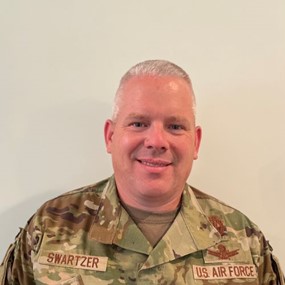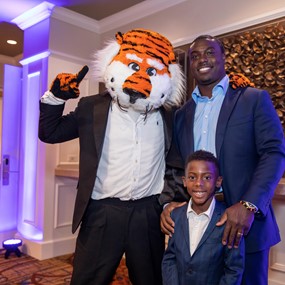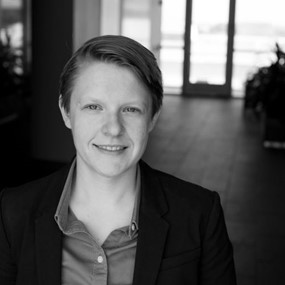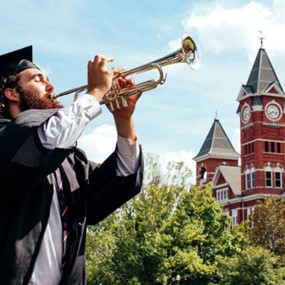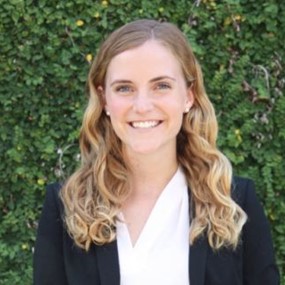Alumni Spotlight: Alyssa White, '14, PhD student at Oxford University
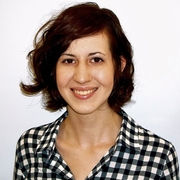
Alyssa White is a PhD student in the archaeology (bioarchaeology) program at Oxford University where she is researching evidence for violence in prehistoric Japanese skeletons. White received her bachelor's degree in anthropology from Auburn in 2014. In this Alumni Spotlight, she talks about her Auburn experience, and how her liberal arts background helped her pursue her career.
Would you tell us about yourself, and how you chose to attend Auburn?
I lived in Auburn most of my childhood and consider it my hometown. I attended Auburn University because I wanted to explore future career paths in an encouraging and healthy environment, and I believed Auburn provided that. I knew that I wanted to study anthropology or archaeology due to my previous study abroad experience. I was fortunate enough to study in Spain for several summers throughout high school, and this experience impressed in me an appreciation for and curiosity about culture and cultural systems. Moreover, archaeology spans such a wide range of human experiences that it offered the opportunity to dip my feet into a wide range of subjects, from chemistry to philosophy to just digging in the dirt.
What was your Auburn experience like as a student?
I was a busy student. I began undergraduate research in my first year as I was considering anthropology and archaeology as future career paths, and I wanted to involve myself as quickly as possible. Thanks to the enthusiasm of my instructor, Danielle Cooke, I spent the first year familiarizing myself with many of the basic principles of human osteology and the subfield of bioarchaeology. In other words, I spent a lot of time looking at bones. During the next three years, under the attentive and wonderful guidance of Professor Kristrina Shuler, I continued to discover what being an archaeological scholar entails. My research experiences, including being selected as an undergraduate research fellow, working as an associate editor for the Auburn University Journal of Undergraduate Scholarship, and helping run the bioanthropology lab, were instrumental in helping me to not only decide to aim for graduate school, but they also gave me the skill-set and experience to make that a reality. In addition to my anthropology degree, I also pursued a degree in Spanish and a minor in Asian Studies. My minor ended up being a great asset for my research in Japan (even if I’m still working on fluency). I’ve found that little bit of understanding can go a long way, and I’ve also learned a great deal about Japanese culture and expectations through the language.
What was your path after graduating from Auburn? And why/how did you decide upon it?
After graduating from Auburn, I knew that I wanted to attend graduate school to work on bioarchaeology in Japan. I took at year off and worked in-between when my husband and I moved to Oxford, UK. During that time, I continued to studying Japanese. As I was already based in Oxford, I was fortunate enough to be able to meet my future supervisor, Professor Rick Schulting, before applying for and being accepted to the Masters of Science in Archaeological Science at the University of Oxford. I received my Master's in November 2016, and I am currently pursuing my DPhil (Oxford’s terminology for a PhD) at Oxford as well. I am in the second year of my doctorate, researching skeletal evidence of violence among prehistoric Japanese hunter-gatherers and early agriculturalists that lived approximately between 1300 BC and the mid 3rd century AD.
Do you think your anthropology/liberal arts education has helped prepare you for success? If so, how?
Undoubtedly, without the care and attention shown to me by the anthropology, Asian studies, and honors faculty, especially Dr. Kristrina Shuler, the late Dr. John Cottier, Dr. Makiko Mori, and Dr. Paul Harris, I would not be where I am today, pursuing two of my passions, Japan and archaeology, simultaneously. The faculty mentioned above along with others in the College of Liberal Arts put a great deal of emphasis on learning how to critically work though a problem and then how to construct and defend a position. Moreover, the anthropology degree was very useful in giving me an idea about the diversity of the field and allowing me to explore different sub-disciplines. Both of these learning priorities better prepared me to know what I would enjoy pursuing, and gave me the skill-set to begin to critically and thoroughly approach my research.
What advice do you have for current students who are looking to follow a similar occupation to yours?
In terms of practical advice I would recommend to get involved and get involved early. Put in the work to see if you can see yourself doing this long-term. Yet, while doing that, remember that there will be failures along the way and that is part of the process too. You will never know unless you just get elbow-deep in the work and decide for yourself if it is for you.
Tags: Alumni World Languages Literatures and Cultures Anthropology

